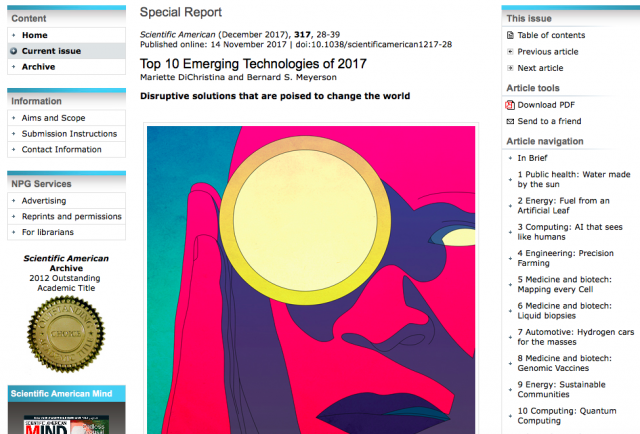NEWS Oakland “Ecoblock” Honored as a Scientific American World Changing Idea for 2017
Special Report
Scientific American (December 2017), 317, 28–39
Published online: 14 November 2017 | doi:10.1038/scientificamerican1217-28
Top 10 Emerging Technologies of 2017
For more on this project, see our real.berkeley.edu twitter feed:
@dan_kammen
Mariette DiChristina and Bernard S. Meyerson
In Brief
- When it comes to preventing and treating disease, better biopsy techniques, genomic vaccines and a massive global project to map every human cell are a boon to public health and personalized medicine.
- Sustainably providing the resource needs of a growing population is becoming more possible thanks to advances in solar-powered water harvesting and artificial photosynthesis that produces renewable fuel. Real-time feedback is making precision farming an efficient way to feed more people.
- Green tech is becoming more accessible to the masses. Entire blocks of homes can be transformed into zero-emissions communities. New approaches in hydrogen-fuel cells could mean cheaper gasoline-free cars.
- Improvements in visual AI and quantum computing are leading to a future when machines interpret data and solve complex problems better than humans.
What if drinking water could be drawn from desert air easily, without requiring enormous amounts of electricity from a grid? What if a doctor could do a biopsy for a suspected cancer without a blade of any sort? What if we didn’t have to wait too long for the result? Technologies that make these visions a reality are expected to become increasingly commonplace in the next few years. This special report, compiled and produced in a collaboration between Scientific American and the World Economic Forum’s Expert Network, highlights 10 such emerging technologies.
To choose the entrants in this year’s emerging technologies report, we convened a steering group of world-renowned technology experts. The committee made recommendations and elicited suggestions from members of the Forum’s Expert Network and Global Future Councils, Scientific American’s board of advisers and others who are tuned in to burgeoning research and development in academia, business and government. Then the group whittled down the choices by focusing on technologies that were not yet widespread but were attracting increased funding or showing other signs of being ready to move to the next level. The technologies also had to offer significant benefits to societies and economies and to have the power to alter established ways of doing things. —Mariette DiChristina and Bernard S. Meyerson
9 Energy: Sustainable Communities
Instead of “greening” individual houses, entire blocks of homes are retrofit into a single efficient unit
By Daniel M. Kammen
In the past decade the construction and retrofitting of individual homes to reduce energy and water use has grown explosively. Yet applying green construction to multiple buildings at once may be an even better idea. Sharing resources and infrastructure could reduce waste, and retrofitting impoverished or moderate-income neighborhoods could also bring cost savings and modern technology to people who would typically lack such opportunities. Working at the neighborhood level does add complexity to planning, but these neighborhood efforts offer rewards that even green single-family homes cannot offer.
One such example is the Oakland EcoBlock project, which I lead at the University of California, Berkeley, with my colleague Harrison Fraker, a professor of architecture and urban design. It is a multidisciplinary endeavor involving urban designers, engineers, social scientists and policy experts from city, state and federal governments, academia, private industry, nonprofits and grassroots organizations. For more on our projects, click here. Or look at the RAEL group twitter feed: @dan_kammen
The program, which has been planned in great detail but has not yet begun construction, will retrofit 30 to 40 contiguous old homes in a lower- to middle-income neighborhood near California’s famous Golden Gate Bridge. It aims to apply existing technology to dramatically reduce fossil-fuel and water consumption and greenhouse gas emissions. We expect to rapidly recoup the money spent on infrastructure with savings from operating expenses while ensuring residents’ long-term comfort and security.
To bring in renewable power, we will install solar panels on buildings throughout the area and send the energy to a smart microgrid. Excess solar energy will be stored via flywheels housed in a communal building. The residents will also share electric cars, which will have access to more than two dozen local charging stations. These measures should reduce annual electricity consumption by more than half and bring carbon emissions to zero—a valuable feat, considering that more than a quarter of U.S. greenhouse gas emissions emanate from residences.
 CREDIT: Eric Petersen
CREDIT: Eric PetersenThe Environmental Protection Agency estimates that as much as 50 percent of California’s home water consumption goes to lawns and gardens. We will treat and reuse wastewater from toilets as well as gray water sent down drains and released by washing machines. The recycled fluid will go toward gardening and irrigation. We will collect rainwater and deliver it to toilets and washers and install efficient fixtures and taps. Treated solid wastes, meanwhile, will be incorporated into compost. Our estimates suggest that the EcoBlock’s system-level redesign will cut demand for potable water by up to 70 percent.
The Oakland EcoBlock project will provide local construction jobs and help revitalize a community. If it is as successful as we predict, it could serve as a model of sustainability that can be replicated elsewhere in the U.S. and beyond. To date, we have received inquiries from Europe, North Africa and Asia, confirming widespread interest in targeting and redesigning whole communities, not just individual homes.

You must be logged in to post a comment.